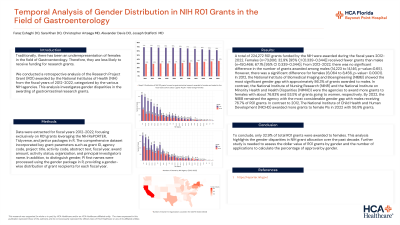Tuesday Poster Session
Category: Practice Management
P4071 - Temporal Analysis of Gender Distribution in NIH R01 Grants in the Field of Gastroenterology
Tuesday, October 24, 2023
10:30 AM - 4:00 PM PT
Location: Exhibit Hall

Has Audio

Faraz Eshaghi, DO
HCA Healthcare/USF Morsani College of Medicine Bayonet Point
Hudson, FL
Presenting Author(s)
Faraz Eshaghi, DO, Sara Khan, DO, Christopher Arteaga, MD, Alexander Davis, DO, Joseph Staffetti, MD
HCA Healthcare/USF Morsani College of Medicine Bayonet Point, Hudson, FL
Introduction: Traditionally, there has been an underrepresentation of females in the field of Gastroenterology. Therefore, they are less likely to receive funding for research grants. We conducted a retrospective analysis of the Research Project Grant (R01) awarded by the National Institutes of Health (NIH) from the fiscal years of 2012-2022, categorized by the various NIH agencies. This analysis investigates gender disparities in the awarding of gastrointestinal research grants.
Methods: Data were extracted for fiscal years 2012-2022, focusing exclusively on R01 grants leveraging the NIH RePORTER, Tidyverse, and janitor packages in R. The comprehensive dataset incorporated key grant parameters such as grant ID, agency code, project title, activity code, abstract text, fiscal year, award amount, activity status, organization, and principal investigator's name. In addition, to distinguish gender, PI first names were processed using the gender package in R, providing a gender-wise distribution of grant recipients for each fiscal year.
Results: A total of 224,272 R01 grants funded by the NIH were awarded during the fiscal years 2012-2022. Females (n=73,806; 32.9% [95% CI (0.339-0.344)] received fewer grants than males (n=150,466; 67.1% [95% CI 0.339-0.344)]. From 2012-2022, there was no significant difference in the number of grants awarded among males (14,223 to 14,146, p-value=0.65). However, there was a significant difference for females (6,064 to 8,456, p-value< 0.0001). In 2012, the National Institute of Biomedical Imaging and Bioengineering (NIBIB) showed the most significant gender gap with approximately 86.3% of grants awarded to males. In contrast, the National Institute of Nursing Research (NINR) and the National Institute on Minority Health and Health Disparities (NIMHD) were the agencies to award more grants to females with about 76.83% and 53.5% of grants going to women, respectively. By 2022, the NIBIB remained the agency with the most considerable gender gap with males receiving 76.7% of R01 grants. In contrast to 2012, The National Institute of Child Health and Human Development (NICHD) awarded more grants to female PIs in 2022 with 56.9% grants.
Discussion: To conclude, only 32.9% of total R01 grants were awarded to females. This analysis highlights the gender disparities in NIH grant allocation over the past decade. Further study is needed to assess the dollar value of R01 grants by gender and the number of applications to calculate the percentage of approval by gender.

Disclosures:
Faraz Eshaghi, DO, Sara Khan, DO, Christopher Arteaga, MD, Alexander Davis, DO, Joseph Staffetti, MD. P4071 - Temporal Analysis of Gender Distribution in NIH R01 Grants in the Field of Gastroenterology, ACG 2023 Annual Scientific Meeting Abstracts. Vancouver, BC, Canada: American College of Gastroenterology.
HCA Healthcare/USF Morsani College of Medicine Bayonet Point, Hudson, FL
Introduction: Traditionally, there has been an underrepresentation of females in the field of Gastroenterology. Therefore, they are less likely to receive funding for research grants. We conducted a retrospective analysis of the Research Project Grant (R01) awarded by the National Institutes of Health (NIH) from the fiscal years of 2012-2022, categorized by the various NIH agencies. This analysis investigates gender disparities in the awarding of gastrointestinal research grants.
Methods: Data were extracted for fiscal years 2012-2022, focusing exclusively on R01 grants leveraging the NIH RePORTER, Tidyverse, and janitor packages in R. The comprehensive dataset incorporated key grant parameters such as grant ID, agency code, project title, activity code, abstract text, fiscal year, award amount, activity status, organization, and principal investigator's name. In addition, to distinguish gender, PI first names were processed using the gender package in R, providing a gender-wise distribution of grant recipients for each fiscal year.
Results: A total of 224,272 R01 grants funded by the NIH were awarded during the fiscal years 2012-2022. Females (n=73,806; 32.9% [95% CI (0.339-0.344)] received fewer grants than males (n=150,466; 67.1% [95% CI 0.339-0.344)]. From 2012-2022, there was no significant difference in the number of grants awarded among males (14,223 to 14,146, p-value=0.65). However, there was a significant difference for females (6,064 to 8,456, p-value< 0.0001). In 2012, the National Institute of Biomedical Imaging and Bioengineering (NIBIB) showed the most significant gender gap with approximately 86.3% of grants awarded to males. In contrast, the National Institute of Nursing Research (NINR) and the National Institute on Minority Health and Health Disparities (NIMHD) were the agencies to award more grants to females with about 76.83% and 53.5% of grants going to women, respectively. By 2022, the NIBIB remained the agency with the most considerable gender gap with males receiving 76.7% of R01 grants. In contrast to 2012, The National Institute of Child Health and Human Development (NICHD) awarded more grants to female PIs in 2022 with 56.9% grants.
Discussion: To conclude, only 32.9% of total R01 grants were awarded to females. This analysis highlights the gender disparities in NIH grant allocation over the past decade. Further study is needed to assess the dollar value of R01 grants by gender and the number of applications to calculate the percentage of approval by gender.

Figure: Graph 1: Distribution of NIH R01 grants focused on gastrointestinal research awarded to females and males for the fiscal years 2012 to 2022
Legend: Purple- males Orange-females
Legend: Purple- males Orange-females
Disclosures:
Faraz Eshaghi indicated no relevant financial relationships.
Sara Khan indicated no relevant financial relationships.
Christopher Arteaga indicated no relevant financial relationships.
Alexander Davis indicated no relevant financial relationships.
Joseph Staffetti indicated no relevant financial relationships.
Faraz Eshaghi, DO, Sara Khan, DO, Christopher Arteaga, MD, Alexander Davis, DO, Joseph Staffetti, MD. P4071 - Temporal Analysis of Gender Distribution in NIH R01 Grants in the Field of Gastroenterology, ACG 2023 Annual Scientific Meeting Abstracts. Vancouver, BC, Canada: American College of Gastroenterology.
